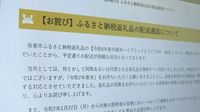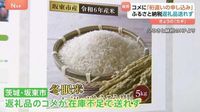In a surprising turn of events, Sakata City in Ibaraki Prefecture is facing a significant shortage of rice intended as return gifts for Furusato tax donations. This situation has arisen due to an overwhelming surge in applications, which the city was unable to fulfill due to inadequate inventory management. According to city officials, approximately 10,540 orders for a 5 kg package of 'Reiwa 6 (2024) Winter Sleep Rice Hybrid Utogou No. 3'—offered in exchange for a 7,000 yen donation—could not be delivered.
The affected applications were made between December 24, 2024, and January 6, 2025. The city attributes this unprecedented shortfall to a combination of rising rice prices and a failure to accurately assess their inventory levels. As a result, they inadvertently accepted more applications than they had stock available to fulfill.
Officials from Sakata City expressed their regret over the situation, stating, "There was a miscalculation that greatly exceeded expectations. We sincerely apologize." They are now working to rectify the issue by planning to deliver new rice after October 2025. For those who prefer not to wait, the city is offering full refunds for their donations.
This year, the donations for rice in Sakata City reached a staggering 102,730,400 yen, a significant increase from 7,727,000 yen in the previous fiscal year. The city’s unexpected success in attracting donations reflects the growing interest in Furusato tax programs, which allow taxpayers to contribute to local governments in exchange for regional products.
As rice prices continue to soar, the demand for such return gifts has surged, but the city acknowledges that their inventory management practices were not equipped to handle this level of interest. The situation has raised questions about how local governments can better prepare for unexpected spikes in demand for popular products.
In light of this incident, Sakata City officials are committed to improving their inventory tracking and management systems to prevent a recurrence in the future. They are also focused on rebuilding trust with their donors, emphasizing their dedication to providing quality products and services that meet the expectations of their contributors.
The city's proactive measures include a public apology and assurances that they are taking steps to ensure that future donations are met with adequate supplies. As the city moves forward, they are hopeful that the new rice harvest will help replenish their stock and allow them to fulfill outstanding orders.
This incident serves as a reminder of the importance of effective inventory management, especially in local governments that rely on community support through programs like Furusato tax donations. With the right systems in place, cities can better meet the needs of their residents and donors alike.
As Sakata City navigates this challenging situation, it highlights the broader implications of rising food prices and the impact on local economies. The demand for rice, a staple in Japanese households, continues to rise, and local governments must adapt to these changing dynamics to sustain their community support initiatives.
The response from the community has been mixed, with some expressing understanding given the circumstances, while others have voiced frustration over the inability to receive promised goods. The city is working to address these concerns and is committed to ensuring that all donors are satisfied with the outcome.
Looking ahead, Sakata City aims to not only resolve the current inventory issues but also to enhance the overall experience for donors in future campaigns. By focusing on transparency and communication, they hope to foster a stronger relationship with their contributors and ensure that their programs can thrive.
As the situation develops, it will be interesting to see how Sakata City implements the changes necessary to prevent similar issues in the future. With the right approach, they can turn this setback into an opportunity for growth and improvement.







